February 29 D-Day
No respite for agitating Kajeemawatta settlers as the
UDA sticks to its ouster deadline:
by Ranil Wijayapala
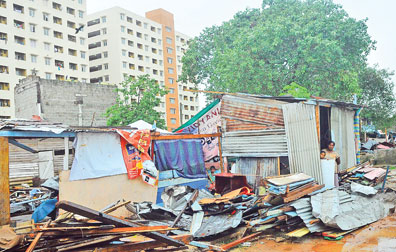 |
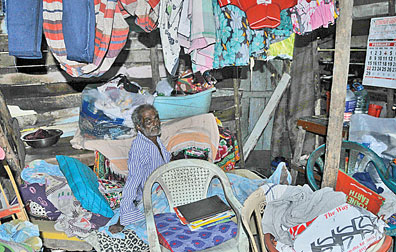 |
|
Premasiri in 239 Watta |
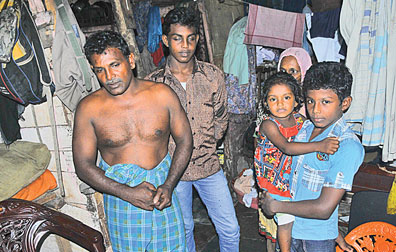 |
|
Fahim and his family |
As Colombo experienced a sudden downpour on February 25 with an
islandwide blackout, which brought everything to a standstill, the
people of Kajeemawatta, Thotalanga had a different battle to confront.
When the country was groping in the dark for a considerable time,
residents of Kajeemawatta had to run to protect their remaining
belongings in the partially destroyed shelters, from the sudden down
pour.
The mud oozing between the toes did not deter them from trying to
protect whatever that was remaining from the heavy downpour, as the
D-Day approaches for them to vacate their homes. The Urban Development
Authority had given them time till February 29 to move out.
Whilst others were busy protecting their belongings in their
partially destroyed shelters, Rohana, a resident from the area had a
different task to attend to. He wanted to ensure the remains of his
mother lying in her partially destroyed house was secured from the rain
as he had no other place to keep the coffin.
His hopes to conduct the final rites of his mother in the open space
in front her partially destroyed house was dashed due to the torrential
rains. He was then compelled to hold the last rites before the lapse 24
hours with the support of neighbours and a Bhikkhu in the area.
Somawathie, the 75- year old mother of Rohana had passed away,
according to residents, due to the trauma she experienced caused by the
destruction to her house. The belongings were exposed to the rain with
no one to take care of them.
Never ending problems
As many underserved settlements in Kajeemawatta and elsewhere in the
country Somawathie had to leave this world without inheriting an inch of
land to be given to her children. Her children and grandchildren have
taken on the battle waged by Somawathie to secure a piece of land for
them.
The settlements in Kajeemawatha has been a never ending problem to
successive governments. The current government will need to address this
issue amicably if it is to carry out its ambitious plan to transform the
Western Province to a well planned megacity.
Though it is accepted that illegal squatters occupying prime land
should be resettled to make way for development it is doubtful whether
the government's policy of providing a house for a house would be
adequate to address the issue as there are generations living in rented
out houses in the underserved settlements seeking houses.
Abject poverty and social issues have compelled them to live in
rented houses and in shanties set up in unauthorised land.
G.N. Premasiri, a 61-year-old occupying an unauthorised structure in
219 Watta or Apple Watta, in Fergusion road Thotalanga and had suffered
a severe ailment, recalled her harrowing experience in her struggle to
own the house after they had to sell the small house they owned in
Kochchikade to treat her daughter who had fallen ill.
He sighs as he looks at the high rise condominium through the broken
planks of his temporary hut in Apple Watta anticipating the bad time he
would have to face without a house and a job as notices appeared in
front of their house to vacate before February 29.
Forty five- year old Mohamed Fahim in 239 Watta with his wife and
three children shares the same sentiments recalling the struggle they
had had face to own a house. After their little house in Oliyamulla was
destroyed as an unauthorised structure, they had to live in rented
houses.
"We had no other option but to move from place to place and finally
settle down in Colombo as squatters", he added.
Sanitary facilities
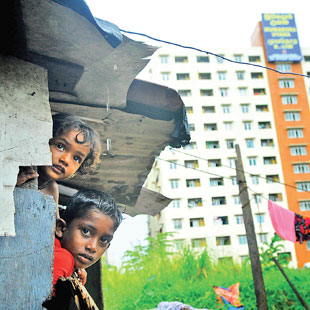 |
|
Children expecting a better
house |
They had to live in temporary huts under appalling conditions. They
lacked basic requirements to lead a decent life. Sanitary facilities
were minimum posing health risks.
The polluted water, which had become a breeding ground for mosquitoes
and many other infectious deceases have become a part of their lives and
electricity and water are luxuries to them.
Except for birth certificates, identity cards and voter registration
they do not enjoy the privileges as citizens. For Fahim, the voter
registration in 2015 is the only proof that he lived in 239 Watta, in
Ferguson Road, Thgotalanga.
"They registered us as voters from the area but had no claim of the
benefits from the government", Fahim added while looking at his
three-year old daughter Fathima Asma, whose legs were infected due to
the polluted water.
According to government policy, neither Fahim nor his children will
be entitled to a house as the owners of the house they live in have
already obtained houses for those that were destroyed.
However, the people in Kajeemawatta claim the ongoing conflict
between the UDA and the suqatters was an issue created by the UDA.
"Had the UDA destroyed all the houses, which were there in 2014 when
they shifted the people living there to the Sahaspura flats, this
situation wouldn't have occurred", Gamini Silva representing the people
in Kajimawatta said.
He claimed that some people were allowed to live in Kajeemawatta,
with the support of UDA officials who carried out the resettlement of
people in Kajeemawatta in the Sahaspura flats in 2014.
"They should not treat a section of people in one way and others in
another way. The rule must be applied to all equally", he said.
Episode
He accused an official at the UDA for creating this whole episode by
allowing people to settle during the last Presidential election. He had
recorded all those facts in a complain lodged at the Grand Pass Police
soon after the UDA officials attempt to remove the people from
Kajeemawatta on February 16.
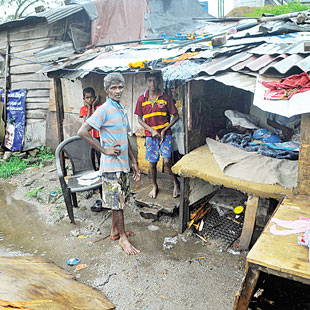 |
|
Dwellings in 239 Watta |
According to Ayanthi, a 49-year-old mother representing the community
in Kajeemawatta explained how politicos and government officials during
the previous and present government settled people in Kajeemawatta after
those who were there were moved to the Sahaspura flats to obtain votes.
Temporary shelter
"It was those who supported the top defence officials of the previous
government who were first settled here and later the people who did not
receive houses were slowly allowed to settled there. When the UDA
officials removed the houses in Somaliwatta on December 30, 2015 they
allowed 26 families living there to put up a temporary shelter at
Kajeemawatta. However that number was increased to 61 by the UDA
officials," Ayanthi added.
She too accused an official with military ranks in the UDA for the
whole episode and said they still take an upper hand in handling the
issue and treat people in a cruel manner.
"If those officials did not allow their suporters to settle there no
others would settle here illegally. They should know how to protect the
land once they evacuate people from there", she added.
"It is wrong to block the road and protest inconveniencing the public
but we did not have any other option. We will not give up our struggle",
she added.
All those comments revealed a political hand in the episode not only
involving politicians of the previous regime but also the present.
Megapolis and Western Development Ministry Secretary Nihal Rupasinghe
said two UDA officials have been appointed to look into the issue and
find those responsible for the situation.
"We will wait and see till the report of the two-member committee is
handed over to us. But our decision to remove all the squatters on
February 29 still stands", he added.
The UDA will give houses only 34 families in Kajeemawatta and others
will have to find as the UDA has already provided houses for each house
that was demolished in Kajeemawatta in 2014. "We are not in a position
to give houses for extended families", he added. He also said though the
UDA considered providing houses for those who living in rented houses in
certain instances, they are not in a position to provide houses for all
of them.
The Secretary said they have identified 60,000 families in all
underserved settlements and they will be systematically resettled in
houses being constructed.
Rupasinghe said under the Megapolis development plan projects such as
the development of the Kelani Valley railway line and the construction
of the elevated expressway from Peliyagoda to Malabe as prioritiess for
this year for which they need to acquire lands.
Therefore, more public agitations can be expected in the time to
come. It is upto the government to find a amicable solution to the issue
of illegal sqatters considering the plight of the homeless who have to
live in rented houses.
(Pix: Rukmal Gamage) |

